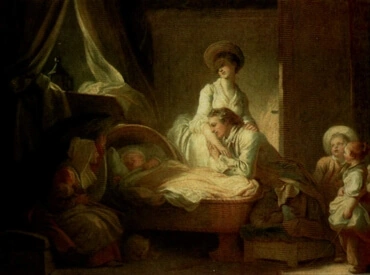In a general sense, being "born" in the Bible represents one spiritual state producing another, usually some form of love or affection producing or "giving birth" to truth or to desires for good. This is not hard to see: If you love someone, that love naturally gives birth to ideas on how to be good to that person and make him or her happy. This is why sons and daughters in the Bible represent true ideas and desires for good. On a higher level, though, being born represents what the Writings call "regeneration," or the life-long process of putting off our natural thoughts and desires and embracing spiritual life from the Lord. This is what the Bible means when it talks about being "born again" – if we live our lives from the Lord, He will eventually take away our evil desires so that we can be "born" as angels in heaven, free of evil desires and dark thoughts. Of course, these two levels of meaning are really one: The Lord is love itself, and if we align with Him we become forms of love and truth ourselves, expressions of His love just as the desire to do something good might be the expression of your love for a friend.
Arcana Coelestia #5348
5348. 'And to Joseph were born two sons' means the good and truth born from this, that is to say, from the influx of the celestial of the spiritual into the natural. This is clear from the meaning of 'being born' as being reborn, and so the birth of truth derived from good or faith derived from charity, dealt with in 4070, 4668, 5160 (for the generations described in the Word are spiritual ones, see 1145, 1255, 1330, 3263, 3279, 3860, 3866); and from the meaning of 'sons', who in this case are Manasseh and Ephraim, as good and truth, dealt with immediately below. For 'Manasseh' means the area of will belonging to the new natural, while 'Ephraim' means the area of understanding belonging to it. Or what amounts to the same, 'Manasseh' means the good present in the new natural, since good exists as an attribute of the will, while 'Ephraim' means the truth present there, since truth exists as an attribute of the understanding. One reads in other places about the birth of two sons. Good is meant by one, truth by the other, as for instance with Esau and Jacob. 'Esau' means good, see 3302, 3322, 3494, 3504, 3576, 3599, while 'Jacob' means truth, 3305, 3509, 3525, 3546, 3576. The like is meant by Judah's two sons by Tamar, Perez and Zerah, 4927-4929; and the same applies here in the case of Manasseh and Ephraim. The birth of these is dealt with here because the subject in what went immediately before this was the influx of the celestial of the spiritual into the natural and the consequent rebirth of it, which is effected solely by means of good and truth.
Arcana Coelestia #1330
1330. That 'these are the generations of Shem' means the derivatives of the second Ancient Church is clear from the meaning of 'generations' as the origin and derivation of forms of doctrine and of worship, as stated already in 1145. Here and elsewhere in the Word 'generations' are nothing other than the things that constitute the Church, thus forms of doctrine and of worship. The internal sense of the Word encompasses nothing else. Consequently when any Church is born the generations of it are mentioned, as with the Most Ancient Church in Genesis 2:4, 'These are the generations of the heavens and of the earth'; and likewise with the other Churches that succeeded it before the Flood, 'This is the book of the generations', Genesis 5:1. The same is true of the Churches after the Flood which were three in number - the first called Noah, the second taking its name from Eber, the third from Jacob and subsequently from Judah and Israel. Verse 1 of the previous chapter, where the first Church is described, starts in similar fashion, 'These are the generations of the sons of Noah', as does the present verse in reference to this second Church taking its name from Eber, 'These are the generations of Shem', and in reference to the third as well, in verse 27 below, 'These are the generations of Terah'. Consequently 'generations' means nothing other than the origins and derivatives of forms of doctrine and of worship in the Church that is being described. The reason why the generations of this second Ancient Church are traced back to Shem, that is, why its beginning is described from Shem onwards, is that 'Shem' means internal worship, here the internal worship of this Church. Not that the nature of the internal worship of this Church was the same as that meant by 'Shem' in the previous chapter, but only that it is the internal worship of this Church.







